Farinetti’s Flour
“My dad kneaded dough, my grandfather was a miller; we’ve been involved with flour for three generations.”
With these words, Oscar Farinetti begins to tell us about himself through images and memories. The life of Eataly is all around him – the colors, smells, tastes, the humanity of the place has become a tangible reality in a short time. Under his guidance, the store thrives in frenetic New York City. His influence is all around; he makes you stop and think, taste, smell, and understand a culture.
“I was born in the midst of forty sacks of flour; my first memory of smell is the acidity of the flour. You know, our strongest memories comes from the nose. As human beings we love or hate each other based on our sense of smell. Durum wheat has an extraordinary scent. It expresses protein, gluten, the basic nutrients of our food staple. We Italians base our cuisine on carbohydrates – meals and flours which are made of ground wheat.”
His intense eyes scrutinize the interlocutor. His words are concrete and open at the same time; they flow freely and cannot be stopped. And so Oscar Farinetti recalls how, at one point in his life, he had to leave the smell of flour behind....
“In 1978, at 24 years of age, I began to work for my dad, who in addition to a pasta factory also owned a coffee roasting plant and supermarkets. He opened the first superstore which also sold non-food products. He hated this aspect of the business, and so he said to me, ‘You’re educated; you deal with that stuff, those home appliances!’”
“It was a 16 x 13 square foot department with four washing machines, six refrigerators, about a dozen black and white televisions, radios, stereos, etc.”
“I would rather have been involved with food, but I agreed. My poetic temperament, which always was and will always be within me, prevails over everything and allowed me to fall in love with these products.”
Farinetti, the great communicator. The ease with which he speaks is astounding, enchanting. His words easily transform into vivid images. His words land on the air around him and live in every detail of the place he created.
He recalls:
“When I saw the first washing machine, this magical white box where you throw dirty clothes in and they came out clean – it was an amazing thing! Imagine what I thought of a refrigerator? This cabinet keeps food and, like magic, makes it last longer.”
“I observed the people to whom I sold a stereo or a television. I was selling happiness, quality of life. I knew right away that electronics would make a difference. It was the last few years of the 1970s. Even then one could imagine that we would not be wrapped around a telephone cord forever, that those Commodore 64s and Amigas would become computers, common appliances. I knew that TV would eventually become interactive and most of all become essential in homes. Home appliances help to save people work, especially women. Irons, washing machines, dishwashers would become more and more wonderful. And so I decided that I would make a great career out of it as a home appliance salesman.”
And the home appliance salesman went on to found UniEuro and Trony.
“My mission is to spread quality of life – to lighten the work load and to bring joy. That department grew bigger and bigger, and one day I convinced my father to open more stores that sold only appliances. Slowly the brand – UniEuro – became more synonymous with household appliances than with food.”
“In 1989 I convinced my father to sell all of the family’s food operations to devote myself to a single focus: consumer electronics. In 2002, I succeeded in creating the largest chain of household appliance stores in Italy first with UniEuro and then with Trony. I was handling a Billion euro business with 3,000 employees and 40 managers, and overall it was going very well.”
But the love for food remained intact, even if it had been set aside for a while.
“In 1989 I bought two farms and two or three restaurants. The restaurant business has always been a hobby, but I had other priorities.”
It was his children who brought him back to flour full-time. Unconsciously or not, Oscar Farinetti had sowed something within his family.
“In 2002 my three children came to me – at the time they were 22, 18, and 14 – and they told me that they had never thought of doing anything else except working with me. I realized that their lives had been determined. That day I decided to sell UniEuro and return to the original family business.”
Farinetti’s decision reflected the sensitivity of a father who looks beyond financial comfort. He knew that he had to involve his children, allow them to grow, and participate in something new alongside him.
“In a company that is so big, so important, already finished, already alive, my children would always be ‘Oscar’s kids.’ They would not have had the privilege of sharing the hopes, emotions, fears, and the adrenaline of building a business. Imagine the level of adrenaline we had here in the 60 days before Eataly New York opened....”
“And so with my children we wrote this new story. In short, we sold. It took a lot of money, about 500 million euro – not because I’m fond of things but I like to give them a value, certainly not for money, but to show that over a period of time I’ve done something tangible in my life.”
“And so I left to build Eataly from scratch. I had been thinking about this since 2002. In 2000 I designed the first Eataly in Turin, which I then opened in January 2007.”
It took all that time?
“It takes a long time to do the research. A project is divided into two parts: the research and then the actual construction. The research is the most important part, that’s where you can never make a mistake. If you’re wrong in the research, you go off in the wrong direction and then you’re screwed. If you do the research but then go wrong in the construction, that’s not a problem; you go back for a few months and you redo it. The research is the vision for the scenario. It goes like this: we research a scenario, a market; I have my own algorithm for doing it, and sooner or later you find a way in. The goal is to find a breakthrough, a way to approach the market in a way that others have not considered. It must be simple, banal. There are still a lot of simple things to be invented.”
“We’re not finding them because we are focusing on complicated matters, thinking that complication is more modern than simplicity. But complication is an old and stupid art, while the art of the future lies in the difficulty of being simple. Around here you will find a lot of signs that say, ‘It’s difficult to be simple.’”
The breakthrough that was lacking in this case was an informal but authoritative place.
“There were formal places with very expensive, fancy products for serious devotees, with very few written descriptions but a lot of oral explanation.”
“There were also informal places with mediocre products where people enjoyed the atmosphere but they could not find the right products. There was no combination of professional restaurants and high quality merchandise.”
We also suggest that it lacked culture....
“Well done; you noticed it. In most stores, there is a lack of information. It’s always been said that school is one thing and the market is another. This is wrong. I think that if we succeed in having customers study the product at the time of purchase – this is best experience in life. So I created a place based on Italian food that integrates a marketplace with education and restaurants.”
Thus Eataly Turin was born.
“We had to look for suppliers, employees, etc., and we opened on January 27, 2007. From day one, it’s been a resounding success because this is a universal format.”
Throughout the interview, one pearl of wisdom follows another:
“You see, we merchants suffer from a lack of creativity. We submit to the creativity of those who invent a product – we buy it ready-made, we put it on a shelf, and we think that the mere fact of putting it on a shelf allows us to enjoy an added value. Then we submit to the creativity of those who come to buy it, those who exercise great creativity in their choices. And so we are stuck in the middle.”
“Many merchants complain that they do not earn a lot, but in reality they don’t really display any kind of creativity; they think that they should enjoy the added value simply because they are in the middle. You’ll recognize them because they always complain about the scenario, and it’s always everyone else’s fault.”
“If people don’t buy and they don’t come into their shops it’s because they’re stupid. They are never wrong, or it’s the fault of the suppliers who are too expensive or the state that makes people pay too many taxes. It’s always somebody else’s fault.”
“Today there are two types of people. There are those who always blame the scenario, the new false optimists. It’s never their fault. And then there are those who are always sure of themselves.”
“People no longer express doubt, only certainty. One can have a casual notion about something, without educating oneself, without going deeper. From that day forward, if someone is sure enough of him or herself, he or she can go around talking about that thing with the air of expert.”
“So there is this overarching presence of certainty on the one hand and too much self-assurance on the other; therefore others always make mistakes but they themselves never do.”
Uncertainty is an important word for Farinetti.
“It creates opens a huge opening for those of us who are humble and who love being full of doubt and uncertainty. When something doesn’t work, we always ask ourselves where we went wrong, and we have a simple, open road in front of us.”
“I’ve applied this concept to my entire life. If you write about this interview and say crazy nonsense the first thing I’m going to ask myself is, ‘Where did I go wrong in communicating?’ I won’t think about how you misunderstood my words. No. I’ll think about what I did wrong.”
“I always feel a sense of duty within me that overrides everything else. But over the years I’ve also learned to combine duty with pleasure. And that’s helped me a lot.”
“And I must reveal something about this store. Every time I open a shop, and I’ve opened 106 in 30 years, I’ve always had the habit of dedicating it to a metaphysical value. Eataly New York is dedicated to the supremacy and the value of doubt over certainty.”
“And so you come in and there’s a sign that reads, ‘Our Policy.’”
“I’ve noticed that Americans are a bit fixated on this. The first rule is that the customer is always right. But it’s not true.”
“I had them write, ‘First rule: the customer is not always right. Second rule: Eataly is not always right. Third rule: Harmony will come from this wonderful doubt because harmony is created by doubt.’”
“If we both have doubts you will stay and listen to me and I will listen to you. And then the doubt becomes curiosity, it becomes intelligence, but it also becomes harmony.”
“Then there’s another sign with Joe, Lidia, Mario, and me that reads, ‘Thanks for coming in. We made Eataly for you but also for us. We’re not sure that you noticed everything. We actually think that there are some things that are wrong, but rest assured: we will change them.’”
“And at the exit there’s another sign: ‘No one is perfect, including Eataly. We already apologize, even before you open the packages.’ We are saying: we definitely made some mistakes. Forgive us. But tell us where we went wrong.”
And so began a wonderful story with Eataly. As he speaks, it almost seems to be a tale told by a storyteller from of the past, but luckily we are in the present.
“It’s been an extraordinary, unstoppable avalanche. It has no limits. It’s a universal format. The ultimate goal for a market to succeed is to build a universal format. For example, Autogrill is the world’s largest chain of roadside restaurants. But an Italian Autogrill is completely different than an English one.”
“Eataly has this feature. Turin is the same as here, Tokyo is also the same, but with a newness that comes from the fact that I love literature, poetry, I love books that differ from each other, and so the same exact format bores me. On the basis of a universal format, I instilled a metaphysical quality into each Eataly in order to personalize each one and give it something special.”
“So it happens that the one in Bologna, which won the most beautiful store in the world award at the Innovation Retail fair in Berlin, is actually a 6,500 square foot library with a small, 2,000 square foot Eataly inside, but when you’re in those 2,000 feet, it’s as if you’re at the one in New York.”
“Rome’s Eataly, which will open on December 9 next year, will be connected to a theater, il Teatro Valle.”
“New York’s Eataly is related to the concepts of integration and biodiversity with respect to human beings and food. In New York I believe I understood, ultimately, why these people have become the most powerful in the world. The reason is simple: they have accepted integration. The integration of these people has created mammoth power, the opposite of what the Northern League claims.”
“I also realized that human biodiversity has moved to biodiversity in products. I began to notice that there were Swiss cardoons. And I wondered, what are Swiss cardoons? Or French spinach…?”
“I understood that over the 400 year history of New York, the French brought their spinach here which was added to local varieties, and it’s the same for the Swiss cardoon. I studied American fruits and vegetables, I studied fish from the Gulf of New York, I studied meat from Montana. I studied the extraordinary American flour and this incredible milk. And I decided that New York’s Eataly would be the result of an integration of American raw material and Italian know-how.”
And he goes back to bread....his bread...almost like closing a magic circle.
“Take my bread – it’s crazy. An American Slow Food fanatic makes this organic stone ground flour that’s very similar to what we at Eataly use in Italy. Then the germ, the yeast, is Italian, and so we gave it this stamp. I brought it illegally from Italy in a bag – and if I were caught with it I would have gone to jail – this living material is 30 year old Italian yeast. The oven comes from Barcelona, because the Spaniards are the best at combining wood-burning cooking methods with cleanliness and ease.”
“And then my chef, the head of bread at Eataly Turin, I brought him here. He left three days ago; he’s Romanian. So consider this American flour with Italian yeast in a Spanish oven made by a Romanian man.”
“It’s the ultimate, and it’s the most delicious bread in the world. It is the world. And the same goes for our pizza, for our fish that comes here from the gulf but that’s cooked with our olives and capers. And so it is for everything else.”
Lastly, a question about Nichi Vendola comes up. In his recent but brief trip to New York, he was sure to stop in at Eataly.
The president of the region of Puglia, as enthusiastic as a little kid, wanted a tour of Eataly and Oscar Farinetti showed him around like an old friend, describing every corner of his wonderland.
“I have a good relationship with all Italian politicians despite my heritage; as the son of a partisan leader, leaning to the left politically is in my genes. But I also have friends who are on the right and I have very good relationships with them. With Nichi, I share the attitude of trying to put a little poetry into everything I do. It’s fundamental. When you succeed, you create this magic that appeals to people.”
We say good-bye to Oscar Farinetti. For him, it’s more important to sell values than to sell products. Is this the secret to his success?
“I cannot tell a lie. I cannot sell you a tomato, claiming that it’s a San Marzano tomato when in fact it’s an ordinary tomato from Puglia. If you have these values you cannot tell lies. Real marketing that works is the truth. Especially during times of economic crisis, liars don’t do well. When people ask me, ‘Can you give some good business tips?’ I reply, ‘Tell the truth. Telling the truth pays off.’”






























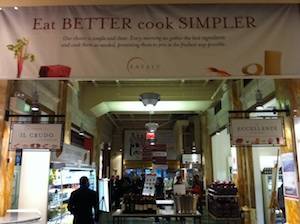
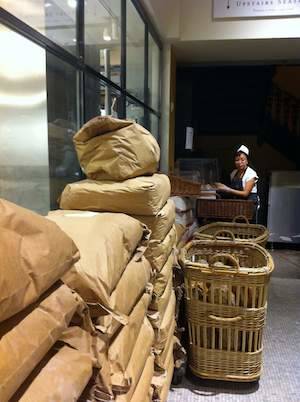
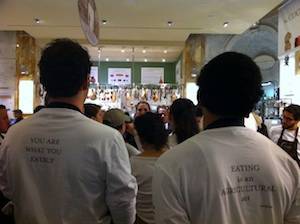
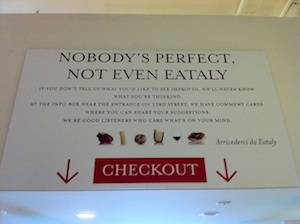
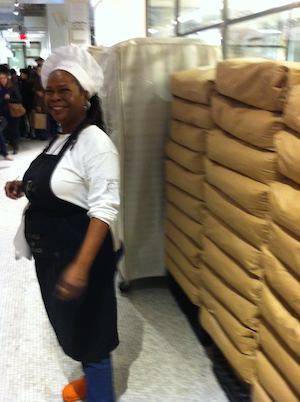
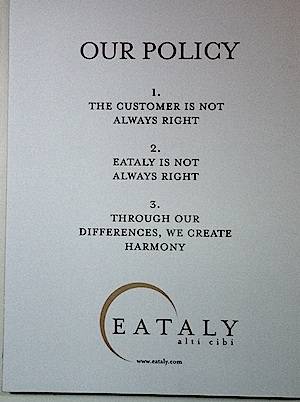
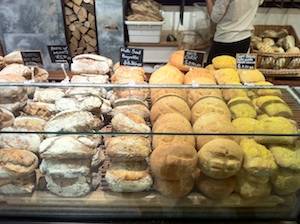
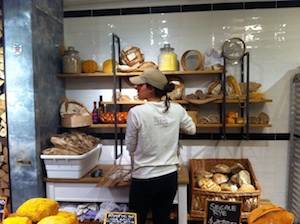
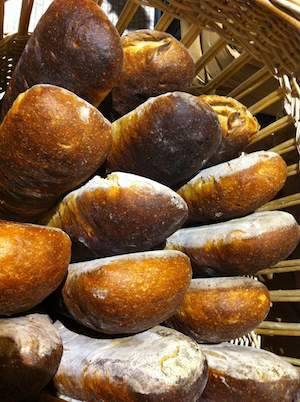
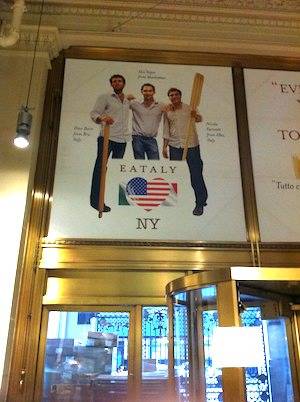







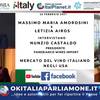
i-Italy
Facebook
Google+
This work may not be reproduced, in whole or in part, without prior written permission.
Questo lavoro non può essere riprodotto, in tutto o in parte, senza permesso scritto.